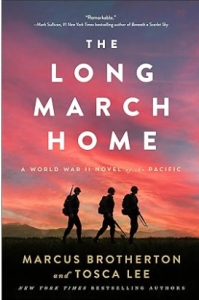Recent winner of the International Book Award in Historical Fiction, The Long March Home was released in May of 2023. The paperback edition came out in October.
From the Publisher
J immy Propfield joined the army for two reasons: to get out of Mobile, Alabama, with his best friends Hank and Billy and to forget his high school sweetheart, Claire.
immy Propfield joined the army for two reasons: to get out of Mobile, Alabama, with his best friends Hank and Billy and to forget his high school sweetheart, Claire.
Life in the Philippines seems like paradise–until the morning of December 8, 1941, when news comes from Manila: Imperial Japan has bombed Pearl Harbor. Within hours, the teenage friends are plunged into war as enemy warplanes attack Luzon, beginning a battle for control of the Pacific Theater that will culminate with a last stand on the Bataan Peninsula and end with the largest surrender of American troops in history.
What follows will become known as one of the worst atrocities in modern warfare: the Bataan Death March. With no hope of rescue, the three friends vow to make it back home together. But the ordeal is only the beginning of their nearly four-year fight to survive.
Inspired by true stories, The Long March Home is a gripping coming-of-age tale of friendship, sacrifice, and the power of unrelenting hope.
From Publishers Weekly
“Brotherton and Lee masterfully capture what it was like for soldiers to face war’s atrocities, as well as the heartbreak of those waiting for them back home. This is a winner. ”
–Malcolm
 Malcolm R. Campbell is the author of the Vietnam War novel “At Sea.”
Malcolm R. Campbell is the author of the Vietnam War novel “At Sea.”

 While growing up, I was part of a Boy Scout troop sponsored by my church. Many meaningful experiences came out of this, not the least of which were camping trips in the Florida Panhandle that would later serve as raw material for the novels I would write. At some point, long after I left town for college and the navy, the church gave up its sponsorship. I didn’t find out until many years later. When I e-mailed the church, nobody seemed to know that it had ever sponsored the troop and, if it had, why the relationship ended. This always bothered me. I kept wanting to find the culprit and ask what the hell they were thinking.
While growing up, I was part of a Boy Scout troop sponsored by my church. Many meaningful experiences came out of this, not the least of which were camping trips in the Florida Panhandle that would later serve as raw material for the novels I would write. At some point, long after I left town for college and the navy, the church gave up its sponsorship. I didn’t find out until many years later. When I e-mailed the church, nobody seemed to know that it had ever sponsored the troop and, if it had, why the relationship ended. This always bothered me. I kept wanting to find the culprit and ask what the hell they were thinking.